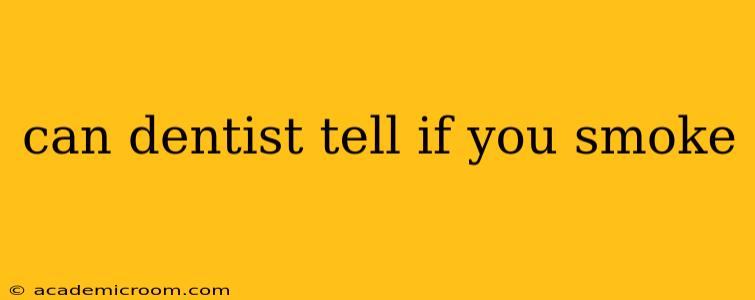Can a Dentist Tell if You Smoke?
Yes, dentists can often tell if you smoke, and they have several ways of detecting it. The telltale signs are not just limited to the smell of smoke on your breath; observant dentists can identify smoking-related issues through visual examination and even by analyzing your saliva. This article will explore the various ways a dentist can detect smoking and the implications for your oral health.
How Can a Dentist Detect Smoking?
Several key indicators allow dentists to detect if a patient smokes:
-
Oral Odor: The most obvious sign is the persistent smell of smoke on your breath. Even if you've brushed your teeth, the lingering smell can be difficult to mask completely. While not definitive proof, it's a strong indicator.
-
Stained Teeth: Nicotine stains teeth a yellowish-brown color, which gradually darkens with continued smoking. This staining is particularly noticeable along the gum line and on the inner surfaces of the teeth. The intensity of the staining can often correlate with the duration and intensity of smoking habits.
-
Gum Disease (Periodontitis): Smoking significantly increases the risk of gum disease. Dentists can visually assess the gums for signs of inflammation, bleeding, recession, and bone loss. These are all classic symptoms of periodontitis, and a dentist will note these during a routine check-up.
-
Oral Leukoplakia: This condition manifests as white patches or lesions on the gums, tongue, or inner lining of the cheeks. While not exclusive to smokers, it's a strong indicator of long-term tobacco use and is considered a precancerous condition. Dentists are trained to identify these lesions and recommend further investigation.
-
Reduced Salivary Flow: Smoking can significantly reduce saliva production, leading to a dry mouth. This dry mouth can increase the risk of tooth decay and gum disease. A dentist can assess saliva flow during the examination.
-
Slowed Healing: Smoking interferes with the body's natural healing processes. If you've recently had any dental work, the dentist may observe slower-than-expected healing as a possible indicator.
-
Halitosis (Bad Breath): Although related to oral odor, halitosis from smoking can be more persistent and pervasive than the smell of just cigarette smoke. The combination of tobacco chemicals and reduced saliva production contributes to persistent bad breath.
Why Does a Dentist Need to Know if You Smoke?
Knowing your smoking habits is crucial for several reasons:
-
Tailored Treatment Plans: Dentists can tailor treatment plans based on your risk factors. For example, if you smoke, they may recommend more frequent cleanings or more aggressive treatment for gum disease.
-
Early Detection of Oral Cancer: Smoking significantly increases your risk of developing oral cancer. Regular check-ups and careful examination allow for early detection, significantly improving treatment outcomes.
-
Improved Oral Health Outcomes: By understanding your lifestyle choices, dentists can provide you with better advice on how to maintain your oral health. This may involve strategies to quit smoking, tailored oral hygiene practices, or recommendations for specialized treatments.
Can a Dentist Tell How Much You Smoke?
While a dentist cannot precisely quantify the number of cigarettes smoked daily, the severity of the signs mentioned above can give an indication of the extent and duration of smoking. For example, heavily stained teeth and advanced gum disease suggest a long history of heavy smoking.
What Happens if My Dentist Knows I Smoke?
Your dentist isn't there to judge; they're there to help. Knowing you smoke allows them to provide the best possible care and support you in maintaining good oral health, which may include advice on quitting smoking resources. Open communication with your dentist is essential for effective treatment.
This information is for general knowledge and does not constitute medical advice. Always consult with your dentist for personalized advice and treatment.
